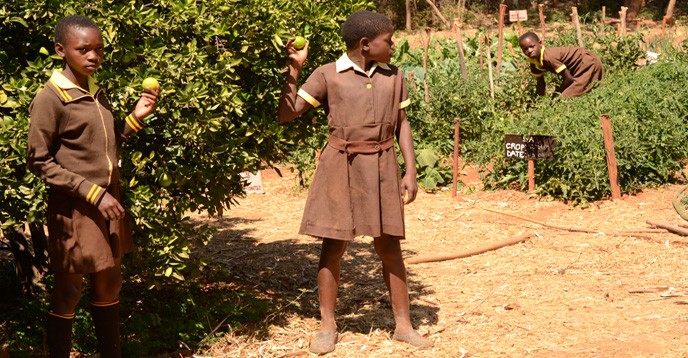website_sihlengeni_primary_school.jpg

Sihlengeni Primary School is located in the arid Umzingwane Rural District of Matabeleland South Province of Zimbabwe, bordering South Africa. The school has 17 teachers and 738 students whose parents are mostly subsistence farmers with very low incomes. Nearly one fifth of the students are Early Childhood Development learners and the curriculum includes maths, English, indigenous language, arts, physical education, information and communications technology and agriculture.
Sihlengeni Primary School receives the Prize for its “Permaculture” programme.
“Permaculture”
Permaculture describes a form of agriculture that seeks to integrate human activity with natural surroundings in order to create highly efficient self-sustaining ecosystems. It recognizes the importance of plant-animal interdependence and emphasises integrated land use and design, including water harvesting and conservation.
Through a participatory whole-institution approach, Sihlengeni’s “Permaculture” programme provides both quality education and increased access to a clean environment, food and water and empowers all of the school’s educators and learners with sustainable development skills and competencies, enabling them to mitigate environmental challenges. For example, the school teaches them how to manage land and use it profitably at their homes. Students learn how to grow and care for trees, to plant grass and to introduce ground cover to reduce land degradation and deforestation. The school conserves land, produces food and recycles waste matter. It has also introduced a number of interrelated activities such as poultry, herbal and commercial gardening, a piggery, jam-making and forest rehabilitation. The food produced is free from fertilizers and pesticides.
Sihlengeni’s “Permaculture” programme impacts greatly on the alleviation of hunger and increases knowledge on food consumption habits. Lives are transformed in a manner that is ecologically sound, economically viable and socially just. This leads to a reduction in environmental degradation and, in turn, promotes food production. It helps to develop infrastructure such as small livestock housing systems and rehabilitates the forest. As a result, unemployment in the school’s adjacent community has decreased. After leaving school, many of the former students form small-scale businesses.
International Jury Recommendation:
“This school demonstrates remarkable resourcefulness, resilience and enterprise in using the principles of ESD through a permaculture and whole-institution approach to manifest transformative sustainability in the school with positive effect on its members and community. Using participatory methodology and inclusive education, it is making sustainable development happen in a way that provides an inspiring example of what can be done with energy and imagination to address SDGs such as those on poverty and climate action. This success story could be emulated by other schools within their own cultural and environmental contexts in other parts of the world.”
Learn more about Sihlengeni Primary School:
- News article: Zimbabwean ‘green oasis’ school wins UNESCO sustainability education prize
- Sihlengeni on Facebook
- Sihlengeni on Twitter
